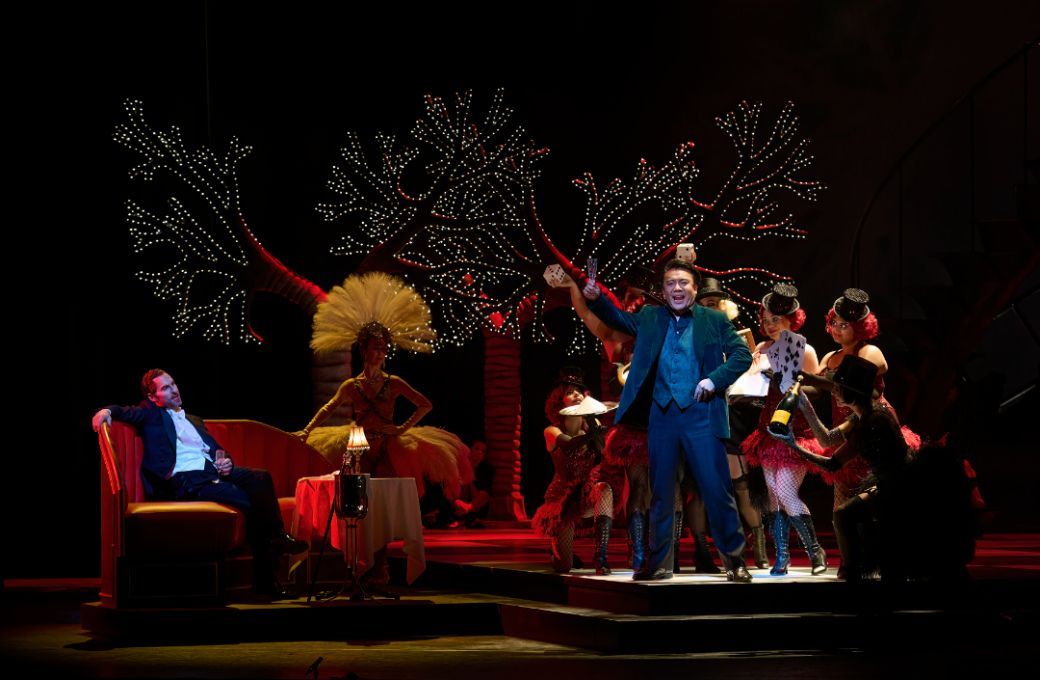There’s a lot at stake in Gounod’s Faust. Even with its Victorian, Christian underpinnings, it is nevertheless the tale of a hero who sells his soul to the devil and a heroine who is callously seduced, gets pregnant and commits infanticide. In the right hands, Faust can still pack a devastating gut punch due to a score and libretto that are at once luscious, comic and cynical. Unfortunately, Amy Lane’s staging at the Canadian Opera Company, the company’s first new, homegrown production in six years, fails to mine the work’s full potential. Despite some trendy references to Tim Burton and Stanley Kubrick in the programme, what we see on stage is disappointingly tame.

The general flatness can be attributed in part to a set design that consists of a few leafless trees, a central ‘spinal’ staircase and an X-ray backdrop of Faust’s torso that barely change throughout the four-act opera. The lighting scheme also lacks variety, monotonously dark with dim highlights no matter the dramatic context. So, there’s little to differentiate between dancing townspeople, soldiers’ returning from war or even a night on the town in Hell. An unfortunate air of cheapness also pervades, perhaps belying budget constraints.
A top-hatted-and-tailed Méphistophélès is accompanied by a pair of dancers straight out of Cabaret, the trio constantly controlling the movements around them. While initially clever, their tricks – and the dancers’ incessant slinking – become tiresome the fourth or fifth time around. In the Walpurgis Night scene, when the devil takes Faust to his underworld realm, the dancers are costumed in a burlesque style, the one male as a cross-dresser who rubs his nipples in an effort to tempt the title character. Like most of the production’s elements, it’s a tacked on attempt at subversiveness that fails to convince.
The stylised handling of the chorus also feels cliched and, at times, downright embarrassing. Odd slow motion, feigned yawning by the women on their first entrance; soldiers skipping around as if riding hobby horses and, completely out of nowhere, their flinging and torturing of stuffed dummies. Too many of these staging choices feel tired, as if recycled from Regietheater or Broadway musicals. The concept therefore lacked any cohesion or serious grappling with the opera’s complex morality.
Characterisation of the principals also suffers from a lack of specificity. Marguerite endures intense suffering, expulsion from her community, madness and, ultimately, salvation. These emotional extremes were not touched upon by Chinese soprano Guanqun Yu who, even in the dramatic church scene, only managed to look mildly perturbed while clutching her baby while being damned for eternity. Yu sang the role beautifully with gleaming lyric tone and security throughout her range, including a well projected lower register.
Likewise, Chinese tenor Long Long as Faust could not be faulted vocally. He possesses an absolutely secure technique that served him well in this long, gruelling role. Top notes rang out with abandon and he even attempted some tender, mezza voce passages. His handling of the French text, however, was not idiomatic. Like Yu, his characterisation was efficient but lacked point.
Of the three main roles, American bass-baritone Kyle Ketelsen as Méphistophélès had the best night, singing suavely, entering fully into the dangerous gentleman concept. His is a more lyrical approach that one might be used to hearing, which suited the Fred Astaire vibe.
Polish baritone Szymon Mechlinski plays Marguerite’s brother, Valentin. He possesses an attractive, rich sound which is, however, prone to woolliness and he has yet to master convincing declamation of French text. His great death scene, in which he brutally curses his sister for bearing a child out of wedlock, should be one of the opera’s dramatic highlights. Like much else, it went for almost nothing and ended with Valentin standing up after dying and walking offstage... why?
Mezzo-soprano Alex Hetherington sang the pants role of Siébel with much charm and tonal beauty. It helps that she is tall and willowy and therefore completely convincing as Marguerite’s dedicated, but hapless suitor. As the heroine’s nosy neighbour, Dame Marthe Schwerlein, mezzo-soprano Megan Latham offered a suitably ripe portrayal, leaping chest-first (the rosy nipple trope making its first appearance) into the comic proceedings. She was saddled with having to heave a fully-laden dessert trolley up several stairs to no specific end.
In the pit, COC Music Director Johannes Debus led the orchestra in a gorgeous account of Gounod’s miraculous orchestration. Singing Nabucco, another ‘big chorus’ opera this fall, the COC Chorus once again displayed what a fine ensemble it is.
Since the departure of Alexander Neef for the Opéra de Paris in 2020, and then the sudden exit of his successor Perryn Leech in June, questions about artistic leadership abound. Hopefully this underdeveloped Faust is a blip in the company’s trajectory.


